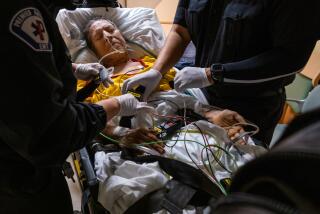Path Cleared for Baby’s Marrow Transplant : Agencies Agree to Let 16-Month-Old Leukemia Patient Have Out-of-State Operation
- Share via
ORANGE — Stephanie Rudat, a 16-month-old leukemia patient in need of a bone marrow transplant, was scheduled to fly to Washington state today to prepare for the risky operation, resolving a four-day battle with Medi-Cal over whether the agency would pay for the procedure.
At a press conference Monday at Children’s Hospital of Orange County, the baby’s doctor and mother announced that Medi-Cal and a division of the Department of Health Services had agreed to let her receive the transplant in Washington. Thursday, the state said it could not fund the operation if it was performed out of state.
Stephanie’s mother, Farhat Rudat, said doctors have told her the transplant is an extremely dangerous procedure and gives Stephanie only a 40 percent chance of survival. But she realizes it is her daughter’s only chance to live.
“If it wasn’t for her positive attitude and the way that she loves life, I wouldn’t have pursued it any further,” Rudat said. “She doesn’t act sick.”
Four days ago, the Department of Health Services told Rudat that her daughter would not be subsidized for a bone marrow transplant, even though a donor had been found in Washington and it was critical to her survival.
But after a search for a suitable donor in California through UCLA Medical Center proved futile, both hospital and health officials determined a donor could not be found within six weeks, a delay that could prove disastrous to Stephanie’s health, said Dr. Mitchell S. Cairo, one of the toddler’s doctors.
“Once everyone realized that we could have the transplant done and it could be expedited in Seattle, , the state was very cooperative,” Cairo said.
Ken August, a spokesman for the Department of Health Services, said his department had to see if a donor was available in California before it could agree to pay for services in Washington. They also attempted to have the donor--already located by a cancer research center in Seattle--fly to California to donate the marrow, but the donor declined.
Officials from Childrens Hospital, Medi-Cal and California Child Services, a division of the Department of Health Services, realized that “the time factor was the critical element” and agreed to pay for the transplant in Washington, August said.
Cairo said that once Stephanie reaches Seattle, she would begin the process of preparing for a transplant, which includes preparing her bone marrow immune system and giving it time to accept the new marrow. Her leukemia must also be kept in remission, which requires additional chemotherapy, he said.
Even though the transplant procedure has been given the go-ahead, Cairo and his colleagues said this is only one tenuous step on the way to recovery. There are several more stages of treatment and observation, he said, and a definite regimen has not been laid out yet.
Stephanie received a diagnosis of acute non-lymphocetic leukemia when she was six weeks old. Chemotherapy sent her quickly into remission and she then had an autologous transplant, in which her own bone marrow was removed and reinserted into her body in an attempt to kill the cancer cells. But she suffered a relapse and an immediate search for a donor sent Stephanie’s doctors to the Fred Hutchinson Research Center in Seattle.
Payment became a problem when Stephanie’s hospital bills surpassed her family’s $1-million insurance cap. Medi-Cal then assumed financial responsibility for her treatment. When the donor was found in Washington, the Rudats were told the transplant must take place in California.
Nurses at Children’s Hospital said they are going to miss Stephanie.
“She has been here since she was six weeks old,” said hospital spokeswoman Marilyn Fisher. “The nurses have seen her take her first steps, have her first Christmas and her first birthday.”
More to Read
Sign up for Essential California
The most important California stories and recommendations in your inbox every morning.
You may occasionally receive promotional content from the Los Angeles Times.










